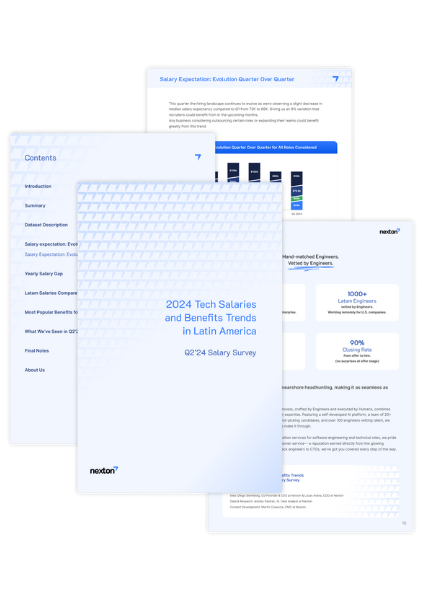Congrats! You were just hired at your new remote job –now what?
Everyone knows that the beginning of any new job comes with an onboarding period. Oftentimes, companies don’t do as well as they could helping talent adapt during their first work weeks. Luckily, Nexton has your back.
We spoke with our talents to learn more about their blockers and successes in the first weeks of a new job. With their feedback and some brainstorming, we were able to come up with these tips for successful onboarding at your new job together.
The importance of day one
Did you know that the first day of your new job is your biggest opportunity to make a good impression? First-day jitters, new introductions, and a ton of new information certainly make day one overwhelming. Here’s a list of our top tips for a great first day:
- Make sure your first impression is always a good one by preparing a 30-second explainer of who you are and what your position is. This doesn’t have to be perfectly rehearsed –but it’s never a bad thing to sound well-versed and ready.
- Listen and observe. Your first day is also your first opportunity to hear about the company's goals and top projects. Get ready to take notes!
- Ask questions! Though much of your first day will likely be spent learning about the company and your position, having a list of questions to ask managers and colleagues shows your interest and good attitude. TIP: Group your questions and deploy them together at the right moment to show your time management skills.

What if your manager is not available?
Picture this: your first day arrives and no one has reached out to you yet. Don’t panic! The most important thing in this situation is to communicate. Proactivity is your best friend when you’re starting a new job –especially when your manager isn’t able to be as present as you had hoped. If you feel like you’re missing any relevant information, don’t hesitate to get ahead and ask! For example:
- What are you expected to do in your first week, month, and quarter? What will your onboarding process be like? If any! (Don't panic if you don't find one, you can talk about this and maybe help your new company create one)
- What are the typical work hours? Who are your teammates?
- Who do you report to and how? Will you have 1:1s with your Manager?
- What tools and credentials will you need to do your job?
Is there documentation available? - Will you be expected to join any daily or weekly meetings? Is there a preferred methodology?
Finally, ask your new teammates for help! It’s not unusual for managers to wear many hats in startups, giving them less time to follow through with your onboarding. Looking for support from your new teammates is a great way to set yourself up for success.

Stay on top of your game
One of the most important skills to show at your new job is time management. Let everyone know your working hours, share your calendar with your team so they know when you’re “available” or “busy” and remember to show any recurrent tasks or appointments. Be honest with your availability- make sure to align what works for you and what’s off-limits. Once all of that is clear and covered, it’s important you stay on top of your game! Show your drive-by:
- Responding quickly –especially during high-intensity hours. Show you’re ready to take on new tasks and challenges! And if you’re not, be clear and quick to let everyone know.
- Being online. When you’re tagged in messages, acknowledge that you received and understood, even with a simple emoji reaction.
- Participating in everything you are invited to. This ties into listening and observing, meetings in your first weeks of work are great opportunities for you to get to know the business, the team, and the product.
- Be forthcoming if you foresee any delays, and communicate blockers as soon as you identify them –tag the right people.
Finally, be confident!
Remember: you were hired for a reason! Confidence is contagious, so showing your team you’re sure of yourself and your skills will no doubt help gain their trust and be comfortable delegating and working with you.
You’ve got this!
Can you think of anything to add? Let us know!


